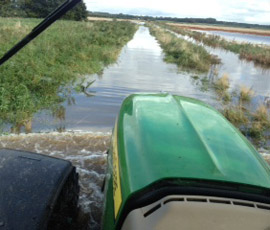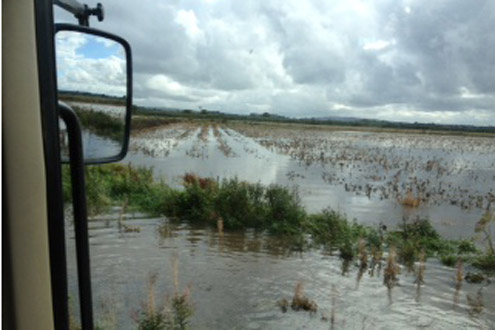Flooded crops could cost growers £200,000

Thousands of acres of potatoes, vegetables and salads in Lancashire have been written off after drainage ditches overflowed and flooded the land.
The NFU said flooding in the county over the past month has left acres of food crops rotting in fields with some farmers in the region facing losses in excess of £200,000.
The union described the situation as a “real emergency” and said it was looking for ways to help the growers who are battling to absorb the potential losses from this year’s flooding issues.
NFU North West policy adviser Aarun Naik said: “In order to alleviate the stress on our growers, the NFU is proposing to take the county’s key agricultural bank managers on to farms to see the damage and hear from the growers.
“We also need to formally talk to some of the large landlords in the area as there is a real risk that some growers are not going to be able to pay rent.”
Many growers in the area blame the Environment Agency for the flooding problems. They claim the ditches have not been maintained properly and that drainage pumps have been left to fossilise due to lack of funding.
Neil Webster, of Whams Farm, in Martin Mere, Southport, has lost 24-30ha (60-70 acres) of potatoes and 16ha (40 acres) of carrots. He only bought the farm last year and said the business was unable to withstand the amount of losses.
Facing similar problems is Colin Bradley, who warned that nobody in Lancashire would have any potatoes in store.
Mr Bradley said: “If there was flooding to 30 houses the Environment Agency would categorise the situation as a category one emergency but if it was 30 acres of lettuce it wouldn’t even register on the Richter scale.”
The NFU met Steve Moore, Environment Agency director for the North West, at Simon Edwards’ Gore House Farm, located in an area badly affected by flooding, the Alt and Crossens catchment.
Mr Edwards, who farms 365ha (900 acres), including 30ha (75 acres) of potatoes, said: “I was really encouraged that the attitude of the Environment Agency has changed.
“We talked about the long-term policies, with the emphasis being on co-operation between Environment Agency employees and farmers.

“What I, and I’m sure many local farmers, would at least like to see is a future where the Environment Agency looks after the main river flows and the on-going maintenance of the pumping stations, while allowing farmers to look after their own ditches.”
Rosie Cooper, MP for West Lancashire, saw the problems for herself at a potato farm near Scarisbrick.
It was criminal to see so much food to go to waste, she said. “When farmland disappears under water we all pay the price for the lost crops. Losing crops of potatoes, wheat and barley means the price of food on the supermarket shelves will carry on rising. Food bills already take a massive chunk of every households’ income.”
Ms Cooper is working with key agencies responsible for managing flooding to deliver a proper and deliverable plan to stop similar damage happening again. She is also pushing the government to bring forward plans for a new deal on flood insurance.
The North West region has approximately 9% of total UK potato growers.
Add your wet weather pictures to our gallery

